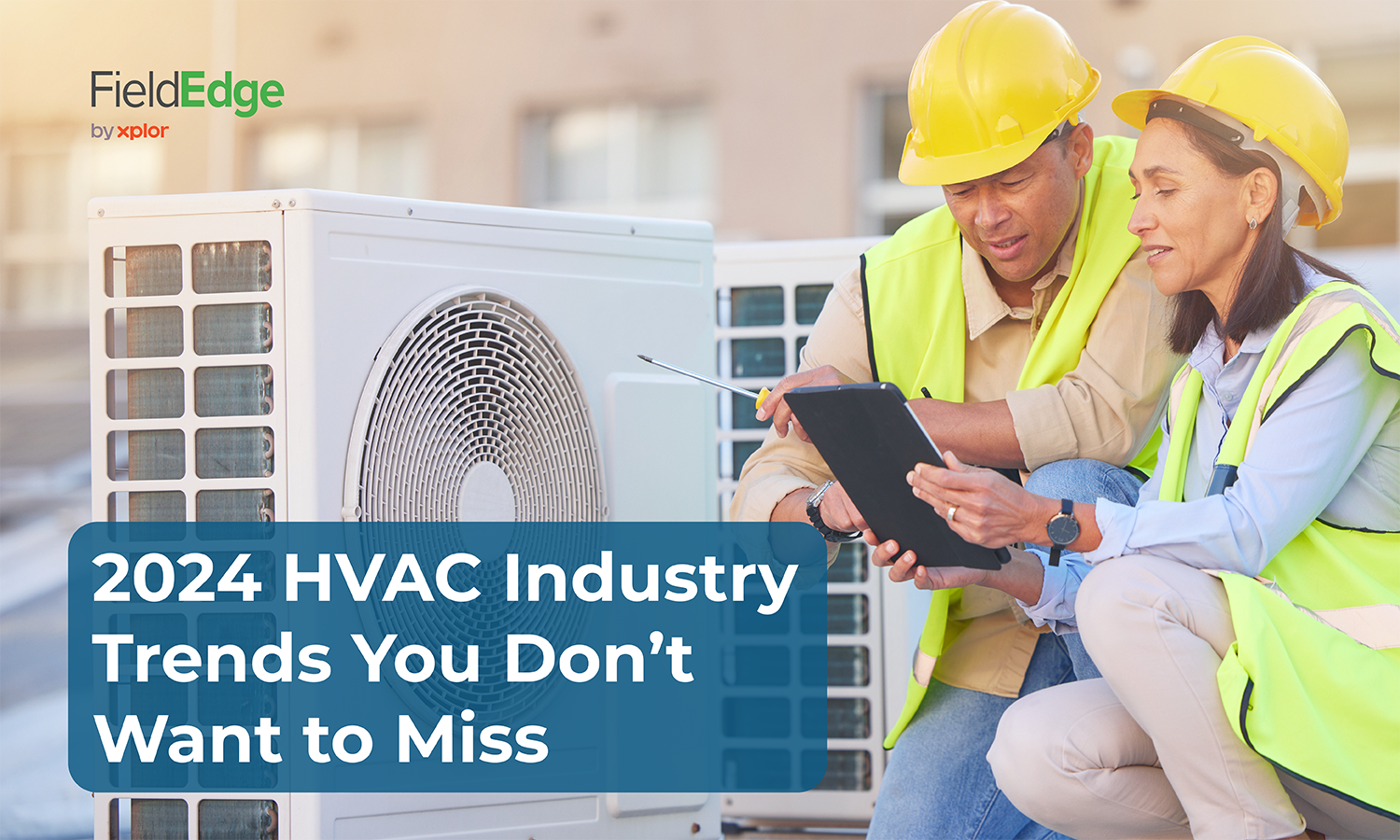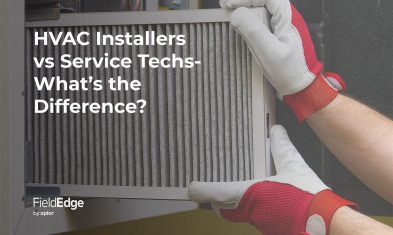Staying ahead of HVAC industry trends is crucial for HVAC techs and office staff. As we navigate 2024, the HVAC industry continues to evolve, driven by technological advancements, sustainability imperatives and changing consumer preferences.
In this blog, we’ll delve into key HVAC industry trends shaping the industry landscape this year, offering insights and opportunities for your business to capitalize on.
Staying up on the latest trends:
- Positions your business as the experts in the field
- Allows you to pivot to new and profitable opportunities
- Keeps you aware of latest regulations and laws
Smart HVAC Systems Revolutionize Efficiency
The integration of smart technology has been transforming HVAC systems, enhancing efficiency, comfort, and control for users. In 2024, this trend is set to accelerate further, with a surge in the adoption of smart thermostats, sensors, and connected HVAC appliances.
These systems leverage data analytics and machine learning algorithms to:
- Optimize energy usage
- Anticipate user preference
- Proactively diagnose issues
This will reduce operational costs and enhance user experience.
As HVAC technicians, familiarize yourself with smart system installation, programming and troubleshooting to meet the growing demand for intelligent HVAC solutions.
Investing in training and certifications related to smart technologies can position professionals at the forefront of this transformative trend.
Upselling smart technology is a great option for increasing each work order. It’s a win for the customer as well as they can reduce their energy bills with pre-programming and proactive diagnostics.
Instituting Sustainable Practices
As environmental consciousness continues to rise, sustainable HVAC solutions are gaining traction across residential, commercial, and industrial sectors.
In 2024, there is a heightened focus on integrating renewable energy sources such as solar, geothermal, and biomass into HVAC systems, reducing carbon footprints and reliance on fossil fuels.
Explore opportunities to incorporate sustainable design principles, energy-efficient equipment, and eco-friendly refrigerants into their projects.
Collaborating with architects, engineers, and sustainability experts can help create environmentally responsible HVAC solutions that align with evolving regulatory standards and client expectations.
Keeping Up On the Latest Legislation
The last few years have seen laws passed to lower energy consumption and emissions. Making sure your business is compliant and up to date is paramount. It also can save your business and your customers money.
- 2024 EPA Phasedown A recent proposal by the U.S. Environmental Protection Agency (EPA) calls for a 40% reduction below baseline levels of HFC production beginning in 2024.
- 2024 EPA Rules For HFC Refrigerant Management and Technology Transitions:
- The EPA’s Technology Transitions Rule aims to decrease global warming potential (GWP) of refrigerants used in air conditioning and refrigeration gear. The ability to install R-410a systems is coming to an end on January 1, 2025. Additionally, more regulations will continue through 2028.
- The refrigerant management rule is still in proposal stage but deals with leak repair requirements. There are also additional rules for HFC recycling and cylinder management.
- DOE SEER 2 Regulations: These went into effect in early 2023. They set efficiency increases for split systems in air conditioning and heat pumps. They were broken down by region and nationwide. Also, these regulations included sell-through requirements and testing.
Though many of these changes may cause expenses initially, in the long run the energy savings favors the HVAC business and its customers. Furthermore, paying attention to HVAC industry trends involving the latest legislation is critical to running a forward thinking HVAC business.
Indoor Air Quality Takes Center Stage
The COVID-19 pandemic has underscored the importance of indoor air quality (IAQ) in maintaining healthy and safe indoor environments. In 2024, there is a heightened emphasis on IAQ solutions that mitigate airborne:
- Pollutants
- Pathogens
- Allergens
This is important for fostering occupant well-being and productivity.
HVAC professionals should prioritize IAQ assessments, filtration upgrades, ventilation enhancements, and air purification technologies to address emerging concerns and regulatory requirements.
Leveraging advanced IAQ monitoring systems and sensors enables real-time data analysis and proactive intervention. This ensures optimal air quality conditions in residential and commercial spaces.
The Rise of Energy-Efficient Heat Pump Technology
Heat pumps are gaining momentum as energy-efficient alternatives to traditional heating and cooling systems, offering significant cost savings and environmental benefits.
In 2024, there is a surge in the adoption of heat pump technology across diverse applications, including residential heating and cooling, commercial HVAC systems and industrial processes.
Heat pumps utilize refrigeration cycles to transfer heat between indoor and outdoor environments, making them versatile and sustainable solutions for climate control.
HVAC professionals should stay up on the latest advancements in heat pump technology, including variable-speed compressors, hybrid systems, and geothermal heat pumps.
Understanding system design, installation best practices, and performance optimization strategies is essential for delivering reliable and energy-efficient heat pump solutions that meet client needs and regulatory requirements.
Digitalization and Remote Monitoring Transform Maintenance Practices
In 2024, digitalization and remote monitoring technologies are two HVAC industry trends reshaping HVAC maintenance practices. These enable proactive monitoring, predictive maintenance, and performance optimization.
IoT (Internet of Things) platforms, cloud-based analytics, and mobile applications empower HVAC professionals to remotely monitor equipment performance, diagnose issues, and schedule maintenance tasks efficiently.
By embracing digitalization tools and predictive analytics algorithms, you can enhance equipment reliability, minimize downtime, and prolong system lifespan.
Investing in training programs and partnerships with technology providers facilitates the seamless integration of digital maintenance solutions into HVAC service operations, driving operational efficiency and customer satisfaction.
Book a FREE demo of FieldEdge today to experience how the best software will TRANSFORM your business growth!
You’re Up To Date On The Latest HVAC Industry Trends!
Now you are ready to roll with all the latest HVAC industry trends. Stay attuned to emerging trends and technological innovations to take advantage of business opportunities. Another way to get ahead of the competition is with top shelf HVAC software like FieldEdge.
FieldEdge is the ultimate field management service software for contractors that connects every part of your business on one simple, yet powerful system. Accessible from anywhere and updated in real-time, FieldEdge gives everyone on your team an extra edge, from the office to the field.
Related: Our Green Energy HVAC Trends




